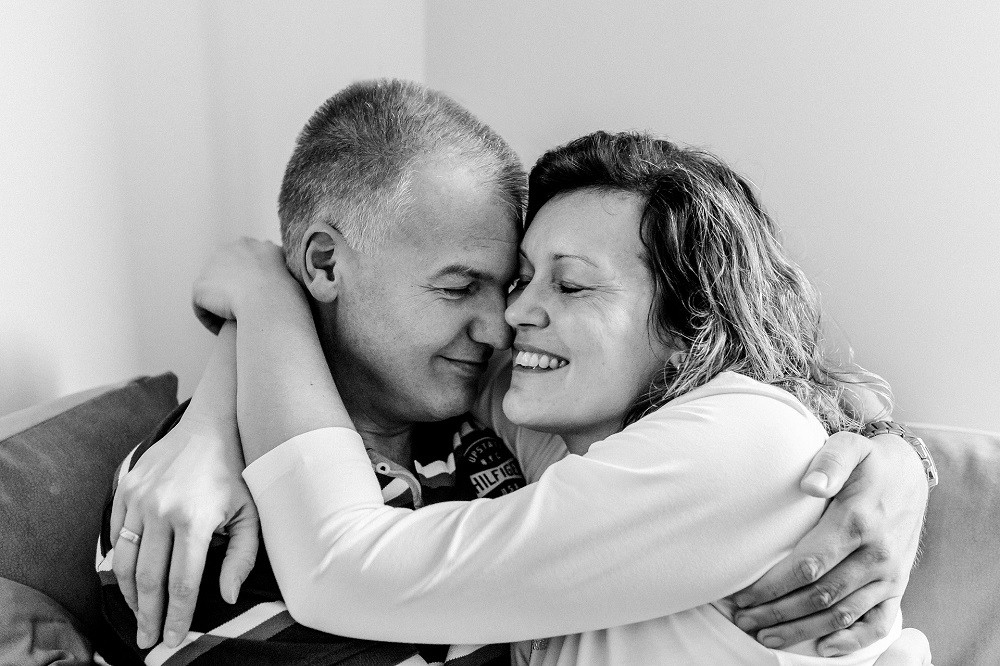The Esteemed Gentleman Articles
11 Simple Gestures To Show Your Love
Gestures of love shouldn't be reserved for Valentine's Day. A successful relationship is one where love is displayed in a variety of ways across different mediums at different times. In this article we will look at 11 simple gestures to show your love.
We will also explain what love is, whether you can be too lovey, and why some people have difficulty showing their love to others. We will also discuss love bombing and its negative effects on relationships. We also included a fun little quiz that will help you discover your love language (not sponsored).
What Is Love?
Love is difficult to define as it can be expressed in a variety of ways; some people enjoy physical touch while others bond over similar interests. Love can be passionate and intimate, a deep connection, a sense of stability, or satisfaction from fulfilling someone's wants and needs. Love can also differ from culture to culture and based on social upbringing.
While we view "love" as an umbrella term with different meanings based on context, the Greeks had seven distinct words for love; from the passionate love of Eros to love of one's interests in Pragma, love doesn't have just one concrete definition.
Can You Be Too Lovey?
Greek storyteller Aesop once said, "It is possible to have too much of a good thing." While we often associate this saying with behaviours like eating too much junk food or consuming alcohol, we often forget that it can also be applied to love. Too much love can be unhealthy.
Being overly lovey is sometimes referred to as "obsessive love". Obsessive love occurs when someone becomes overly fixated on another person, constantly trying to shower them with gifts, love, and affection. These people will often put the object of their obsession on a pedestal and do everything within their power to keep them happy. Obsessive lovers will often neglect their own needs in favor of the needs of the other person, believing that their happiness is directly correlated with the other person's happiness (In other words: "I'm not happy unless they're happy").
A Quick Note On Lovebombing:
"Love bombing" is the use of excessive affection as a manipulation tactic to gain someone's trust. Signs of love bombing include being showered with gifts, an over-indulgence of admiration and praise, and pressure to move the relationship along quickly. A love bomber does these things in hopes of making their partner feel dependent on and obligated to them and ultimately gaining full control.
Once the love-bombed partner feels special and loved, the bomber becomes abusive and devious, turning the gifts and admiration into stamps on a proverbial punch-card that can be exchanged for other favours like limiting the amount of time the other person can spend with their friends, forbidding them to see certain people, or sex.
Obsessive love and love bombing are often done by people with tendencies toward narcissism, insecurity, or trust and dependency issues. If you notice signs of obsessive love or love bombing in your own relationship or that of someone close to you, seek assistance from a certified professional counselor or psychiatrist; if the relationship is abusive, then contact authorities if it is safe to do so.
Is Showing Love Difficult?
Showing love can be difficult for some people, due to past relationship trauma, growing up in an unaffectionate household, mental health issues, emotional disconnect, fear of rejection, or low self-confidence, among other reasons. Some people find it very, very difficult to open up to others no matter the situation. You should never force someone to show love if they don't want to.
Some people may hesitate to show love as they fear that vulnerability makes them a target for manipulation. They don't want to experience pain like they did in past relationships, or they aren't ready for a new relationship just yet. These people may want to take the relationship at a slower pace and may become anxious if things start moving too quickly for their liking.
It's best not to force love or affection on people who feel uncomfortable. Ask your partner how they would like to be shown love and be sure to always have open communication with them. Listen to their needs and respect their boundaries. Remember that "no" is a complete sentence.
Are There Different Ways To Show Love?
People show their love and affection in different ways. Some enjoy physical affection like hugging, kissing, holding hands, cuddling, or intimacy while others favour tangible expressions like hand-written love notes, cards, or small gifts. Others prefer verbal acts of love like reassurance, cracking jokes, or saying "I love you".
Some people enjoy acts of chivalry (and, for the record, it isn't dead), and others prefer being independent. Some people like multiple kinds of affection while others may just like one or two. You should always communicate with your partner and show them love in ways they are comfortable with. Be sure to let them know how you like to be loved so they aren't guessing or trying to read your mind.
Discover Your Love Language With This Quiz
Gary Chapman wrote a book titled The Five Love Languages. These five love languages include:
- words of affirmation (compliments)
- quality time
- gifts
- acts of service
- physical touch
Mr. Chapman believes that every person has one primary and one secondary love language. We decided to add this quiz so you can quickly determine what your primary love language is. You can complete the quiz by clicking here.
11 Simple Gestures To Show Your Love:
We compiled 11 simple gestures to show your love. This isn't a definitive list, since there are hundreds of ways you can show your love, but it will get you on the right path. Some gestures may work better than others depending on your own and your partner's love languages.
Communicate Openly
Every successful relationship is built upon a solid foundation of honesty, respect, trust, and open communication. Being able to share both the good and bad with your partner shows that you are able to express your emotions and vulnerability without fear of judgement or hostility. You confide in them and trust them enough to help you if you ask.
Being able to discuss difficult topics is a skill that requires time and patience but will pay off in dividends when topics like finances, politics, or family matters arise. These conversations can turn emotional, leading to arguments, but they can also provide opportunities to work together and formulate solutions, strengthening the relationship. Being able to navigate these touchy subjects will help form pillars of understanding and acceptance with your partner.
Open communication also requires being a good listener. A good listener gives their partner their complete undivided attention, resists the urge to interrupt, and shows they're listening through non-verbal cues like facing their partner, making eye contact, and removing distractions such as phones (also known as "phubbing").
Performing Small Acts Of Affection
Small acts of affection can be as simple as sending a "thinking of you" or "I love you" text. These small acts don't require much time or money, but they can make a huge difference if your partner is having a bad day or just needs a reminder that they're loved.
These small acts should be done spontaneously and without being asked. Other examples of small acts of affection include:
- Writing hand-written love notes
- Getting their favourite snack or a gift "just because"
- Cooking a meal for them
- Making them breakfast in bed
- Doing chores around the house so they can relax
Sprinkle In Some Physical Affection
Another love language is physical affection. Physical affection doesn't always lead to intimacy. A simple act such as holding hands or putting your arm around your partner can make them feel safe, secure, and loved. Our levels of trust, attachment, and connection grow when we engage in physical touch.
Other forms of physical attention include:
- Sitting side-by-side
- Hugging
- Kissing
- Cuddling
- Playing with their hair
- Giving them a neck or back massage
Love knows no bounds. Physical affection can be displayed in long-distance relationships, too. If you're on a video call with your partner you can move to a quiet space, make eye contact, and use body language like blowing them a kiss or making a heart shape with your hands.
You could also set up a virtual date where you and your partner dress up and enjoy a meal together via video
call while confessing how much you miss each other. You could also start planning dates for when you see each other again. If you want to plan a date that's easy on your wallet, we have an article with 15 unique ideas.
Accept And Acknowledge Their Affection
Accepting and acknowledging your partner's affection will help build a stronger romantic bond. Cuddling with them and embracing their hugs for just a few seconds longer are simple ways of accepting their affection. Your partner may also use verbal cues like saying they love you or appreciate you.
Let your partner know you appreciate the things they do for you by writing them little notes, letting them know in person, or returning the favour. Just remember that keeping score in a relationship can be toxic.
A real, loving relationship is built on trust and mutual generosity, not keeping a running list of who does more. Your partner may show their love differently than you, and that's okay as long as you are both communicating your needs and wants in your relationship.
Say "Please" And "Thank You" More Often
Some tasks require more than one set of hands. Asking your partner to help can be daunting, but simply adding a gentle "please" to the beginning or end of your request can increase the chances of them helping. This can also create stronger communication skills within the relationship as you and your partner navigate instructions and assist each other.
"Thank you" is a powerful phrase that can be used to show appreciation for things your partner has done for you. It could be anything from helping finish a task, making your favourite meal, or even just listening to you vent about your day. A genuine thank you should involve eye contact, positive body language (like facing them, for example), and letting your partner know what exactly they did to help you and how it makes you feel.
Make Quality Time For Them
Spending quality time with your partner will help strengthen your relationship. Sharing experiences together, be it just chatting in bed or dressing up and trying a new restaurant, creates lasting memories. These experiences, no matter how big or small, will make your partner feel significant, special, and (most importantly) loved.
Quality time can be spontaneous, like trying a new activity, or it can be planned, like going for a walk every Sunday morning. No matter what the quality time activities are, they should never feel like a chore.
Quality time doesn't mean spending every waking moment with your partner practically attached at the hip, nor does it mean just occupying space near them while in the same room. No. Quality time is exactly what it sounds like: dedicated time spent together, enjoying each other's company.
Give Them Genuine Compliments
A genuine compliment is a sure-fire way to make your partner feel loved and appreciated. To give a genuine compliment, it must come from a place of authenticity. Inauthentic compliments are often shallow and easy to see through. A genuine compliment comes from the heart and has meaning and weight.
Giving your partner a genuine compliment is more than just telling them they look nice. It's noticing their new hairstyle or outfit. It's admiring their patience when it comes to things that make you frustrated. It's appreciating the small gestures they do for you. A genuine compliment should express your appreciation for them and the things they do.
Genuine compliments don't have to be reserved for just your partner. Let your friends know how much they mean to you, tell that one co-worker that stays late that you appreciate their dedication, notice someone doing something nice for someone else. Happiness is contagious. Help spread happiness by giving genuine compliments.
Remember The Small Details
Small details like the name of a childhood friend or pet may seem insignificant, but remembering them and bringing them up in conversation with your partner could mean a lot to them. These small details show that you weren't just passively listening, but you made a conscious effort to remember what they said. This can help build strong emotional bonds with your partner since they feel heard when they speak to you.
Making mental notes of their favourite things like clothing style, taste in music, foods, and scents can aid you when buying them a gift. A gift based on things they've mentioned in conversation or shown you will mean more than a gift card or money.
Respect Their Boundaries
Setting boundaries in a relationship is healthy, helping you and your partner determine what is acceptable and what isn't. Understanding and respecting these boundaries will keep the relationship running smoothly. Boundaries are put in place to create safe environments, protect mental health, and avoid arguments over touchy subjects.
There are many forms of boundaries in relationships including:
- Cultural boundaries
- Emotional boundaries
- Financial boundaries
- Physical boundaries
- Sexual boundaries
- Time boundaries
Support Them In Their Interests
Supporting isn't the same as sharing. If your partner has a hobby that doesn't interest you, don't feel obligated to get involved. Instead, support them and let them reap the benefits of doing something they love to do. Their interests and hobbies may provide them with an avenue of relaxation and meditation.
Show support by asking them questions about their interest or complimenting them on something they spent a lot of time on. Be encouraging and give them your undivided attention if they show you something or ask for an opinion. Be sincere and show them that you care. Share their happiness and wins.
Be open to joining your partner if they invite you. Remind yourself that it's fun to try new things and experiences. Who knows; you may find something that intrigues and interests you. Or at the very least, you may see what makes your partner so interested in it.
Be Their #1 Fan
You don't need to have a big foam finger to support your partner, but be there on the sidelines cheering them on and meet them at the finish line to congratulate them on their accomplishment. Let them know that you are there for them along their journey and encourage them when times get tough.
Cheer your partner up when they're feeling blue, remind them that you're there for them no matter what, give them physical affection, surprise them with a small gift or gesture. But, above all, love them no matter the outcome.
Sometimes a bit of tough love works, but only if your partner can handle it. They could view your tough love as anger or frustration, which could lead them to become defensive and fear that they are being judged.
Be Spontaneous
Being spontaneous isn't the same as being unpredictable. Spontaneity is performing random acts of affection like an unexpected hug from behind or a kiss on the cheek, a surprise "just because" gift, a surprise date or concert, or embracing your inner child for some silly fun.
Spontaneity leads to excitement and adventure. Being able to burst into song and dance while out with your partner shows them that you can be silly and outgoing, which will make them laugh, which deepens emotional connections and create lasting memories.
Be careful with being spontaneous as it can also have negative consequences. Respect boundaries, don't make your partner feel uncomfortable, and never put anyone's life in danger.
Share Laughter
Frequently laughing with your partner is key to a great relationship. Studies have shown that couples that laugh together experience greater closeness and deeper emotional connections. These couples have an enhanced ability to communicate effectively, allowing them to more easily discuss sensitive subjects and find solutions than couples that don't laugh together.
Outgoing couples use humour as a stress reliever. They can act silly and childlike around their partner without fear of judgement, letting them blow off steam in a playful way. Some couples use humour as a coping mechanism, allowing them to laugh their way through difficult times or situations.
Summary
Even the smallest of actions can have huge impacts in a relationship. Being able to show your love and appreciation through these simple gestures can strengthen your bond with your partner and keep your relationship from becoming stale. Be open to expressing your love in new ways. These will help create everlasting memories you and your partner can share forever.
When you subscribe to the article, we will send you an e-mail when there are new updates on the site so you wouldn't miss them.












Comments